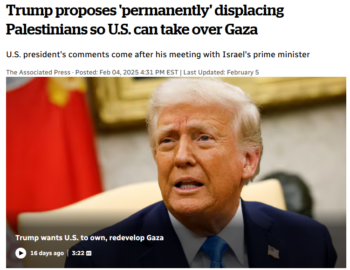
News outlets often preferred euphemisms like “displacing” or “resettling” to the more accurate “ethnic cleansing, as in this CBC headline (2/4/25).
Earlier this month, President Donald Trump said that the US will “take over the Gaza Strip” and “own” it for the “long-term” (AP, 2/5/25), and that its Palestinian inhabitants will be “permanently” exiled (AP, 2/4/25). Subsequently, when reporters asked Trump whether Palestinians would have the right to return to Gaza under his plan, he said “no” (BBC, 2/10/25).
After Trump’s remarks, United Nations Secretary-General Antonio Guterres (Reuters, 2/5/25) said “it is essential to avoid any form of ethnic cleansing.”
Navi Pillay (Politico, 2/9/25), chair of the UN Commission of Inquiry on the Occupied Palestinian Territory, said that
Trump is woefully ignorant of international law and the law of occupation. Forcible displacement of an occupied group is an international crime, and amounts to ethnic cleansing.
Human Rights Watch (2/5/25) said that, if Trump’s plan were implemented, it would “amount to an alarming escalation of forced displacement and ethnic cleansing of Palestinians in Gaza.”
Clarity in the minority
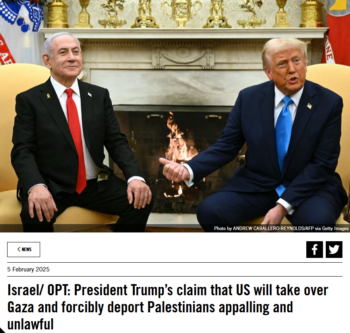
Amnesty International (2/5/25) called Trump’s proposal to forcibly transfer the population of Gaza a flagrant violation of international law”—but the phrase “international law” was usually missing from news reports on the plan.
I used the news media aggregator Factiva to survey coverage of Trump’s remarks from the day that he first made them, February 4 through February 12. In that period, the New York Times, Wall Street Journal and Washington Post combined to run 145 pieces with the words “Gaza” and “Trump.” Of these, 19 contained the term “ethnic cleansing” or a variation on the phrase. In other words, 87% of the articles these outlets published on Trump’s plan to ethnically cleanse Gaza chose not to call it ethnic cleansing.
A handful of other pieces used language that captures the wanton criminality of Trump’s scheme reasonably well. Three articles used “forced displacement,” or slight deviations from the word, while five others used “expel” and another nine used “expulsion.” Two of the articles said “forced transfer,” or a minor variation of that. In total, therefore, 38 of the 145 articles (26 percent) employ “ethnic cleansing” or the above-mentioned terms to communicate to readers that Trump wants to make Palestinians leave their homes so that the US can take Gaza from them.
Furthermore, the term “international law” appears in only 27 of the 145 articles, which means that 81% failed to point out to readers that what Trump is proposing is a “flagrant violation of international law” (Amnesty International, 2/5/25).
A ‘plan to free Palestinians’
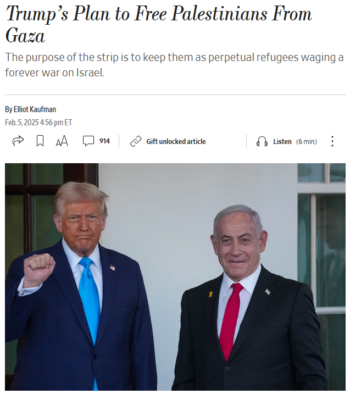
A Wall Street Journal op-ed (2/5/25) hailed “Trump’s Plan to Free Palestinians From Gaza”—in the same sense that the Trail of Tears “freed” the Cherokee from Georgia.
Several commentators in the corporate media endorsed Trump’s racist fever dream, in some cases through circumlocutions and others quite bluntly. Elliot Kaufman (Wall Street Journal, 2/5/25) called Trump’s imperial hallucination a “plan to free Palestinians from Gaza.”
While the Journal’s editorial board (2/5/25) called what Trump wants to do “preposterous,” the authors nonetheless put “ethnic cleansing” in scare quotes, as if that’s not an apt description. The paper asked, “Is his idea so much worse than the status quo that the rest of the world is offering?”
Sadanand Dhume (Wall Street Journal, 2/12/25) wondered why “If Indians and Pakistanis Can Relocate, Why Can’t Gazans?” To bolster his case, Dhume noted that 2 million people died as a result of the India-Pakistan partition, and cited other shining moments in 20th century history, such as Uganda’s expulsion of Indians in the 1970s. That these authors implicitly or explicitly advocate Trump’s plan for mass, racist violence demonstrates that they see Palestinians as subhuman impediments to US/Israeli designs on Palestine and the region.
Bret Stephens (New York Times, 2/11/25) wrote that
Trump also warned Jordan and Egypt that he would cut off American aid if they refused to accept Gazan refugees, adding that those refugees may not have the right to return to Gaza. The president’s threats are long overdue.
Ethnically cleansing the West Bank
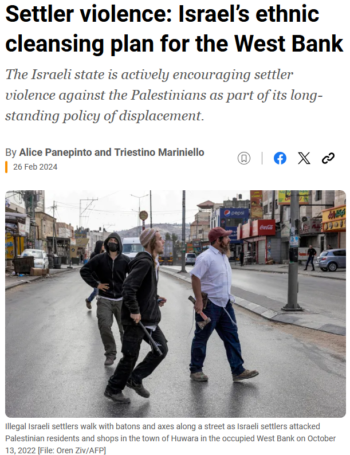
Al Jazeera (2/26/24): “Settler violence is a central part of the Israeli state’s policy and plan to ethnically cleanse the occupied Palestinian territory.”
A similar pattern exists in coverage of the West Bank, where evidence of ethnic cleansing is hard to miss, but corporate media appears to be finding ways to do just that.
Legal scholars Alice Panepinto and Triestino Mariniello wrote an article for Al Jazeera (2/26/24) headlined “Settler Violence: Israel’s Ethnic Cleansing Plan for the West Bank”:
Supported by the Israeli security forces and aided and abetted by the government, settler violence is a central part of the Israeli state’s policy and plan to ethnically cleanse the occupied Palestinian territory in order to establish full sovereignty over it and enable settlement expansion.
The authors noted that, at the time they wrote their article, 16 Palestinian communities in the West Bank had been forcibly transferred since October 7, 2023.
In October 2024, UN Special Rapporteur Francesca Albanese found that throughout the Gaza genocide, “Israeli forces and violent settlers” have “escalated patterns of ethnic cleansing and apartheid in the West Bank, including East Jerusalem.” In the first 12 months after October 7, Albanese reported, “at least 18 communities were depopulated under the threat of lethal force, effectively enabling the colonization of large tracts” of the West Bank.
Euro-Med Human Rights Monitor (2/10/25) said that Israel’s “latest ethnic cleansing efforts” entail “forcibly uproot[ing] thousands of Palestinians in the West Bank,” accompanied by
the bombing and burning of residential buildings and infrastructure, the cutting off of water, electricity and communications supplies, and a killing policy that has resulted in the deaths of 30 Palestinians…over the course of 19 days.
According to the United Nations Relief and Works Agency for Palestine Refugees in the Near East (UNRWA) (2/10/25), Israeli military operations in Jenin camp, which expanded to Tulkarm, Nur Shams and El Far’a, displaced 40,000 Palestinian refugees between January 21 and February 10.
Unnoteworthy violations
I used Factiva to search New York Times, Wall Street Journal and Washington Post coverage and found that, since Panepinto and Mariniello’s analysis was published just under a year ago, the three newspapers have combined to run 693 articles that mention the West Bank. Thirteen of these include some form of the term “ethnic cleansing,” a mere 2%. Nine more articles use “forced displacement,” or a variation on the phrase, 31 use “expel,” 11 use “expulsion” and five use some variety of “forced transfer.”
Thus, 69 of the 693 Times, Journal and Post articles that mention the West Bank use these terms to clearly describe people being violently driven from their homes—just 10%. Many of the articles that address the West Bank are also about Gaza, so the 69 articles using this language don’t necessarily apply it to the West Bank.
Of the 693 Times, Journal and Post pieces that refer to the West Bank, 106 include the term “international law.” Evidently, the authors and editors who worked on 85% of the papers’ articles that discuss the West Bank did not consider it noteworthy that Israel is engaged in egregious violations of international law in the territory.
‘Battling local militants’
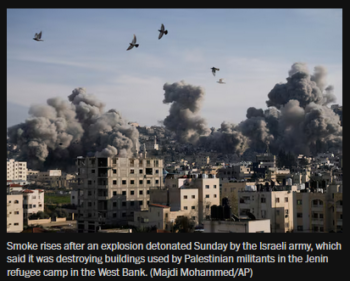
The Washington Post (2/2/25) captioned this image of IDF bombing with Israel’s claim that it was “destroying buildings used by Palestinian militants.”
Rather than equip readers to understand the larger picture in which events in the West Bank unfold, much of the coverage treats incidents in the territory discretely. For instance, the Wall Street Journal (1/22/25) published a report on Israel’s late January attacks on the West Bank. In the piece’s 18th paragraph, it cited the Palestinian Authority saying the Israeli operations “displaced families and destroyed civilian properties.” In the 24th paragraph, the article also quoted UNRWA director Roland Friedrich, saying that Jenin had become “nearly uninhabitable,” and that “some 2,000 families have been displaced from the area since mid-December.” Palestinians being driven from their homes are an afterthought for the article’s authors, who do nothing to put this forced displacement in the longer-term context of Israel’s US-backed ethnic cleansing.
A Washington Post report (2/2/25) on Jenin says in its first paragraph that the fighting is occurring “where [Israeli] troops have been battling local militants.” The article then describes Palestinian “homes turned to ash and rubble, cars destroyed and small fires still burning amid the debris.” It cited the Palestinian Health Ministry noting that “at least five people were killed in Israeli strikes in the Jenin area, including a 16-year-old.”
Establishing a “troops vs. militants” frame at the outset of the article suggested that that is the lens through which the death and destruction in Jenin should be understood, rather than one in which a racist colonial enterprise is seeking to ethnically cleanse the Indigenous population resisting the initiative.
The rights of ‘neighbors’
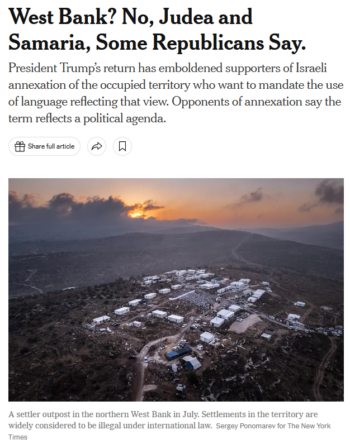
This New York Times piece (2/4/25) acknowledges that Israeli settlements have “steadily eroded the land accessible to Palestinians”—but doesn’t call this process ethnic cleansing.
The New York Times (2/4/25) published an article on Republican bills that would require US government documents to refer to the West Bank as “Judea and Samaria,” the name that expansionist Zionists prefer. The report discusses how Trump’s return to office “has emboldened supporters of Israeli annexation of the occupied territory.”
The piece notes that hundreds of thousands of Israelis have “settled” the West Bank since Israel occupied it in 1967, and that Palestinians living there have fewer rights than their Israeli “neighbors.” The author points out that “the growing number and size of the settlements have steadily eroded the land accessible to Palestinians.”
Yet the article somehow fails to mention a crucial part of this dynamic, namely Israel violently displacing Palestinians from their West Bank homes. Leaving out that vital information fails means that readers are not a comprehensive account of the ethnic cleansing backdrop against which the Republican bills are playing out.
Recent coverage of Gaza and the West Bank illustrates that, while corporate media occasionally outright call for expelling Palestinians from their land, more often the way these outlets support ethnic cleansing is by declining to call it ethnic cleansing.
This content originally appeared on FAIR and was authored by Gregory Shupak.
Gregory Shupak | Radio Free (2025-02-20T22:36:03+00:00) Media Afraid to Call Ethnic Cleansing by Its Name. Retrieved from https://www.radiofree.org/2025/02/20/media-afraid-to-call-ethnic-cleansing-by-its-name/
Please log in to upload a file.
There are no updates yet.
Click the Upload button above to add an update.